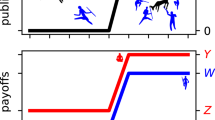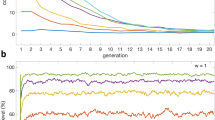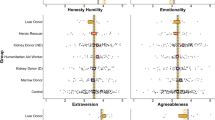Abstract
The claim by Johnson et al. that human cooperation in social-dilemma games violates rational-choice theory is not justified1. If people have altruistic aims, altruistic behaviour is a rational means by which to achieve their proximate goals. From an evolutionary viewpoint, we need to explain why humans are often altruistic by strong reciprocity2,3,4. Although kin selection, reciprocal altruism and indirect reciprocity explain relevant forms of human cooperation5,6,7, they do not ultimately explain strong reciprocity8.
This is a preview of subscription content, access via your institution
Access options
Subscribe to this journal
Receive 51 print issues and online access
$199.00 per year
only $3.90 per issue
Buy this article
- Purchase on SpringerLink
- Instant access to full article PDF
Prices may be subject to local taxes which are calculated during checkout
Similar content being viewed by others
References
Gintis, H. Game Theory Evolving (Princeton Univ. Press, 2000).
Henrich, J. & Boyd, R. J. Theor. Biol. 208, 79–89 (2001).
Gintis, H. J. Theor. Biol. 206, 169–179 (2000).
Fehr, E. & Gächter, S. Nature 415, 137–140 (2002).
Silk, J. B. Am. Anthropol. 82, 799–820 (1980).
Gächter, S. & Falk, A. Scand. J. Econ. 104, 1–25 (2002).
Milinski, M., Semmann, D. & Krambeck, H. J. Nature 415, 424–426 (2002).
Fehr, E. & Henrich, J. in The Genetic and Cultural Evolution of Cooperation (ed. Hammerstein, P.) (MIT Press, Cambridge, Massachusetts, in the press).
Tomasello, M. & Call, J. Primate Cognition (Oxford Univ. Press, New York, 1997).
Fischbacher, U., Gächter, S. & Fehr, E. Econ. Lett. 71, 397–404 (2001).
Author information
Authors and Affiliations
Corresponding author
Rights and permissions
About this article
Cite this article
Fehr, E., Gächter, S. The puzzle of human cooperation. Nature 421, 912 (2003). https://doi.org/10.1038/421912a
Issue date:
DOI: https://doi.org/10.1038/421912a
This article is cited by
-
Quantitative determination of the level of cooperation in the presence of punishment in three public good experiments
Journal of Economic Interaction and Coordination (2008)
-
Nonhuman Species’ Reactions to Inequity and their Implications for Fairness
Social Justice Research (2006)
-
God’s punishment and public goods
Human Nature (2005)



